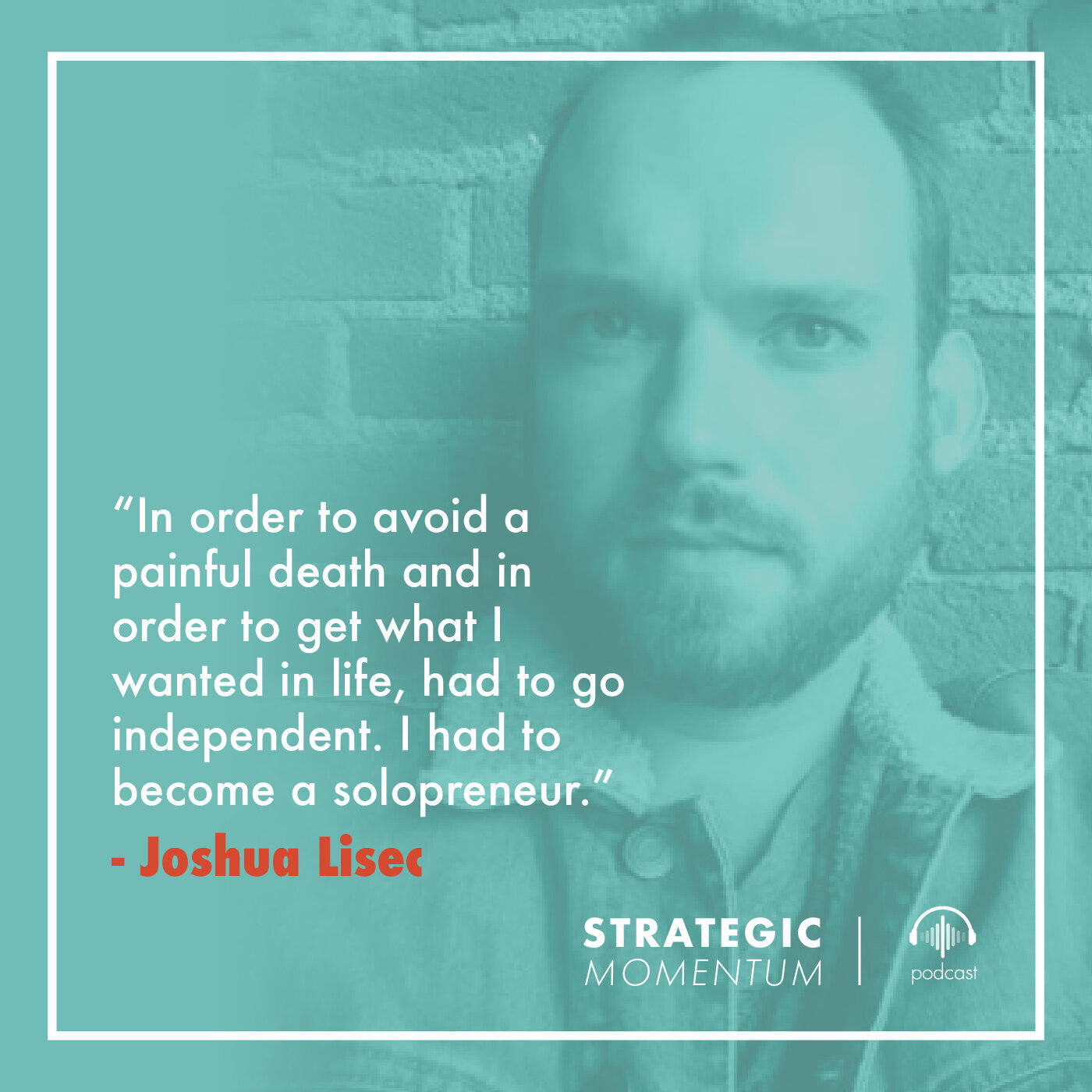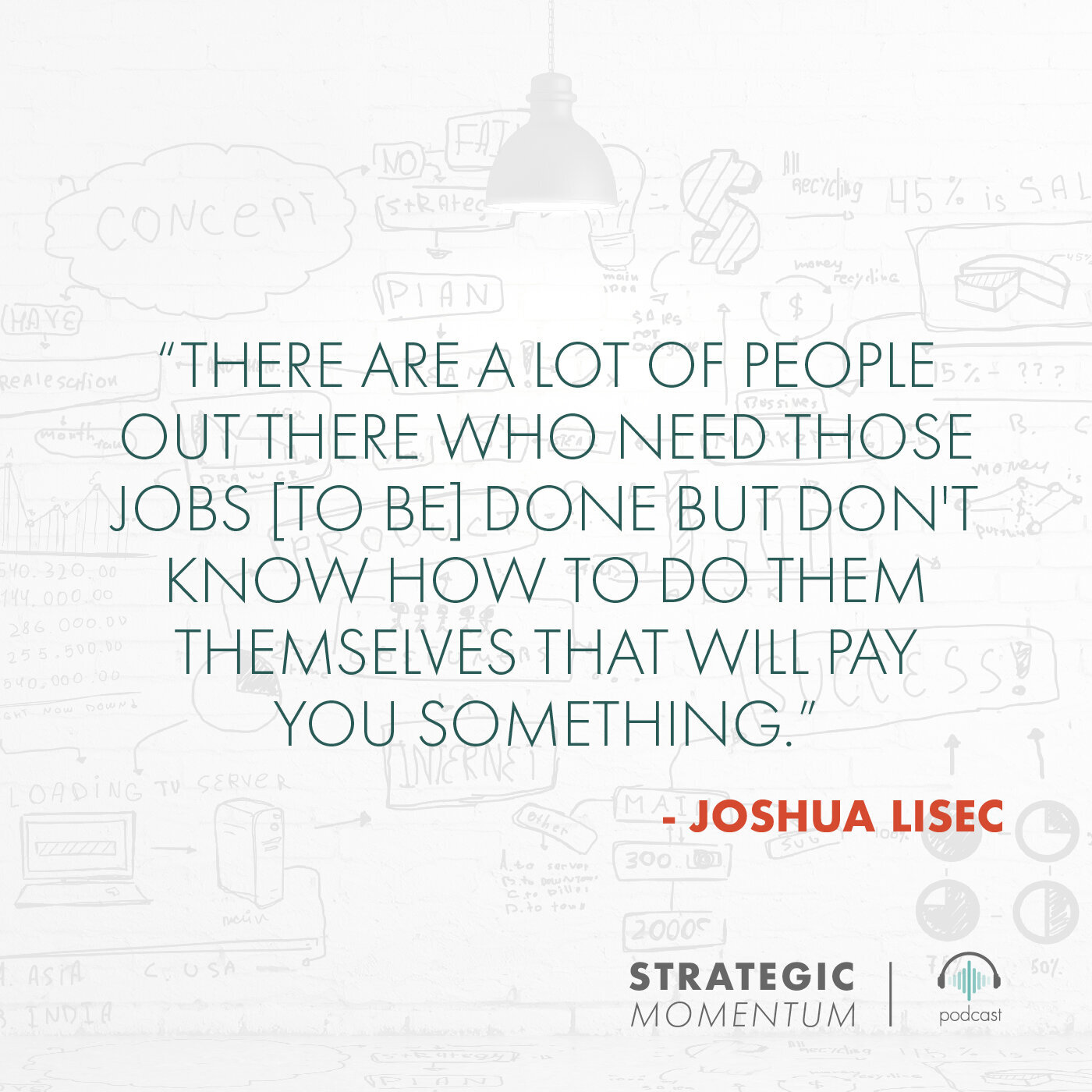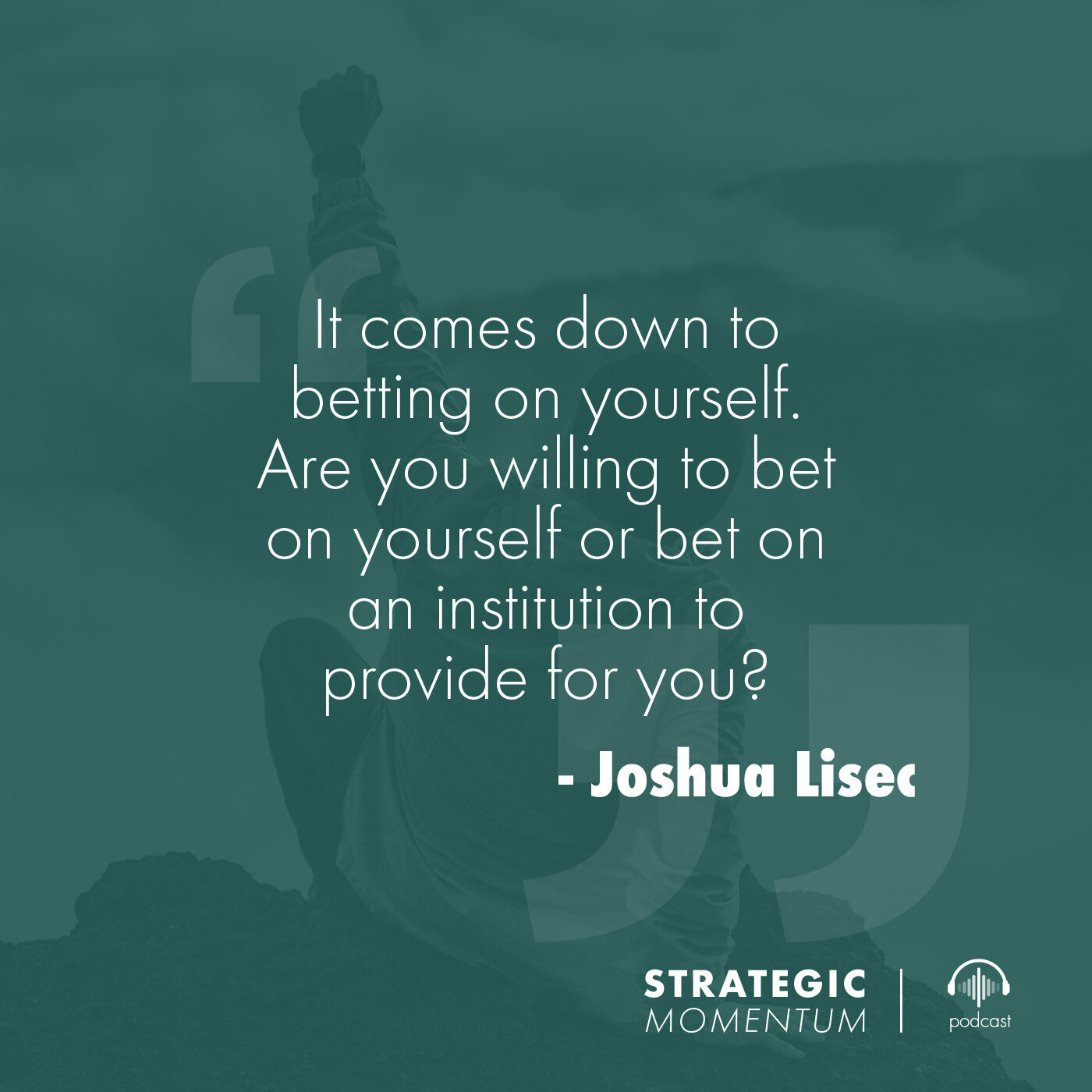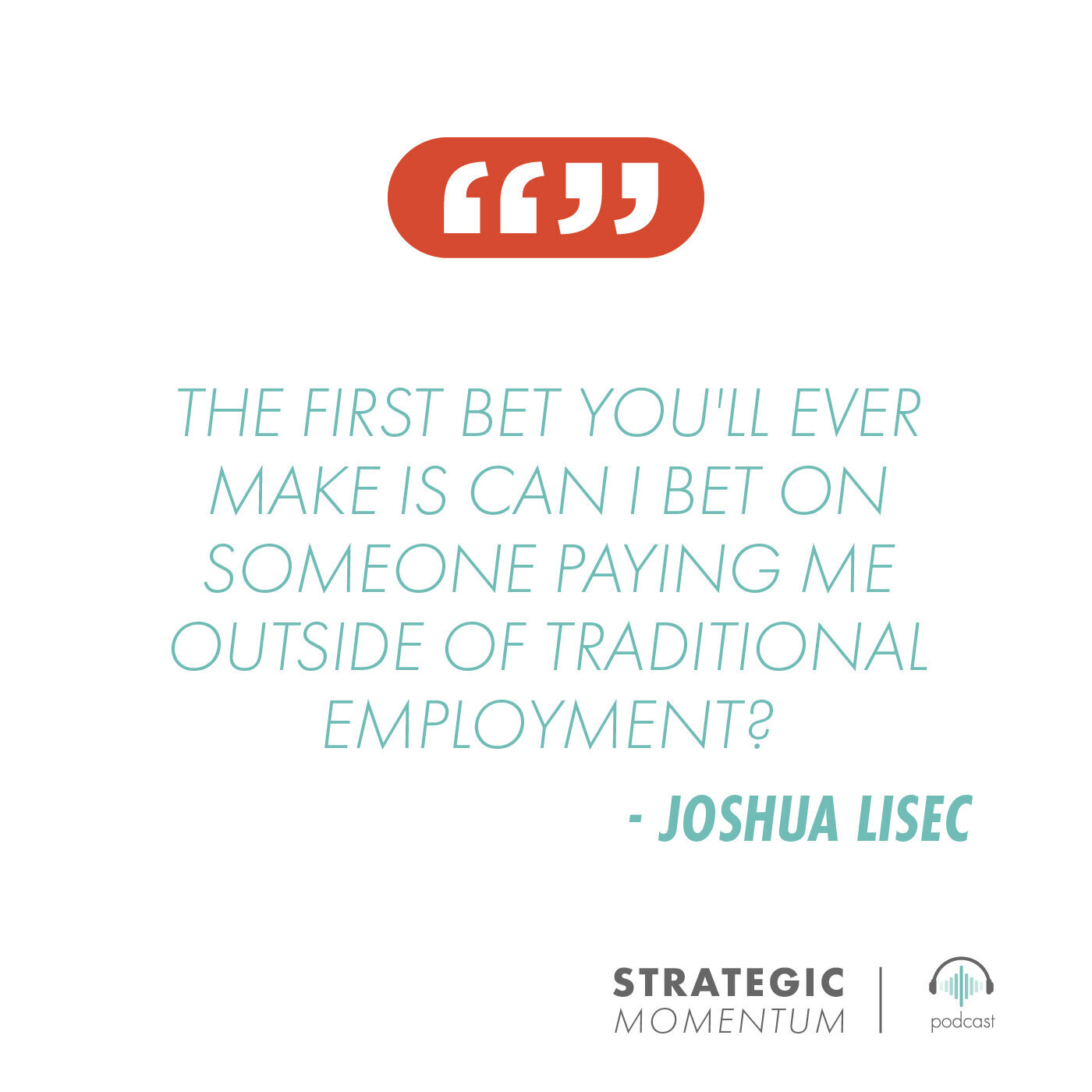Ep. 81 - Building a Successful Solopreneur Business: Identifying the Jobs to be Done and Creating Your Own Career Mashup — with Joshua Lisec
Find Us Wherever You Listen To Podcasts
The world of work has fundamentally changed, with many becoming responsible for their own professional development. Career interests and goals are no longer singular, but rather broad and dynamic. There’s a desire to continually learn, improve and grow — and even make a pivot into a different role or industry in order to create that career which reflects one’s expansive capabilities and abilities.
That’s something that Joshua Lisec knows all too well. He’s the founder of The Entrepreneur’s Wordsmith and a Certified Professional Ghostwriter. Since 2011, he has ghostwritten more than fifty books and has become a leading authority on author voice authenticity.
In fact, he’s the only award-winning certified professional ghostwriter of number one international bestselling books on the planet.
In this episode, Joshua shares:
The non-linear career journey that led him to being a ghostwriter
How he has been able to develop his successful solopreneur business by developing his own unique career mashup.
What it takes to create the traction that you are looking for when venturing out on your own
Interestingly, this path wasn’t something he planned for. In fact, the career he has today is the result of a freelance business that he started years ago.
Going off the Traditional Path
Joshua realized early on that the corporate world wasn’t going to get him where he wanted to be, financially or personally. He grew up believing in the traditional track of getting good grades, getting a good job, and being set for life.
However, this story he was told about putting his time in to achieve the American Dream was just that — a story. He turned to freelance writing at the suggestion of his professors in college as an alternative to a city government job, where self-generated initiative wasn’t rewarded and deviation from the norm was discouraged. Becoming part of bureaucracy didn’t allow him to contribute where he knew he could add value.
His first freelance writing gig paid him a rate of $1.67 an hour. But for Joshua, “that 1.67 an hour gig felt like a million bucks because it was the first time I had been paid for what I felt was me, my knowledge about writing, my skills as a writer, and my background as someone who wanted to become a novelist.”
In fact, his aspiration since he was young was to become a novelist, and when he was 20 years old, he got a two-book publishing deal to write ‘Indiana Jones for Millennials.’
It was through promoting these novels that two fans of his book independently reached out and asked Josh to help them write their life story. He fell backwards into the world of ghostwriting, and nine-and-a-half years ago later, he’s working on his 55th book.
Working in Parallel to Find the Merge Point
Post college, Joshua parallel pathed multiple tracks— he freelanced, promoted his novels, and worked a W2 job at a large telecommunications company.
While writing articles, blog posts, and product descriptions for various e-commerce companies around the globe, he was simultaneously doing book signings, events, and panels, which is how his future clients began to learn about him. These independent paths started to merge: clients wanted to have a book to tell their story, not a textbook but rather an entertaining narrative. And it turns out that long-form content drives business outcomes well.
With the traction that he was getting from the freelance business, he thought “what do I need a job for?” Further, the corporate experience at the telecommunications company was less than desirable given the negative sentiment towards Millennials. So he knew he had to pivot and go independent; a solopreneur was born.
Continually Expanding Skills to Optimize the Career Mashup and Your Business
Joshua credits intersectionality as one of the core components of his success; all of the experiences he had and skills he picked up along the way laid the foundation for his business. Ultimately, leveraging long-form content through books that drove business results became the catalyst that propelled Joshua’s career forward.
But to get to where he is now, he has had to continually test, learn and expand his skill sets, including being a content marketer and even a 'ghost publisher,' which is what further separated Joshua from the field. Not only did he mashup his existing talents and interests, he also added new capabilities based on client needs. He chose to go broad and deep.
It’s this continual building of his own talent stack and the alignment with his core skills and interests that enabled him to create his ideal career.
Pushing Past the Fear and Identifying the Jobs to be Done
You may struggle to get past the fear when you want to venture out and do something new, just anything different than what you are doing or what you were taught. Joshua reminds us that it comes down to betting on yourself. Do you trust an organization or do you trust your own capabilities to get you where you want to go?
Creating a hybrid of skills based on varied experiences can lead you down that path of a portfolio career of sorts, enabling you to pursue all of your passions and interests vs. being forced down a narrow and limited road.
So whether you want to start a side hustle, be a freelancer, or become a solopreneur like Joshua, you can start by thinking about the job you can do, identify where you can add the most value based on spotting the trends, and ensure your skills align with customer needs.
Career Advice
Follow the jobs-to-be-done framework towards professional achievement and personal fulfillment.
Key Takeaways:
To create traction for yourself as a freelancer or solopreneur, you need to make sure you address two key questions:
What ongoing results can you create?
Who is willing to pay you for these ongoing results?
Understand the value that your clients are expecting and be clear on the value you will be delivering.
Minimize the likelihood of a one-and-done engagement by over delivering on your first project so that you’re able to do more in the future.
To break that feast or famine cycle that most service-based professionals, freelancers, and solopreneurs who sell a service face, try to work with clients for whom you can create results on a long-term basis (e.g. minimum six months).
That gives you a significant lead time for getting other clients along the way.
The more lead time you have in getting clients, the more income you can build, the more safety you have.
As a freelancer or solopreneur, you have two jobs: marketing yourself to get new clients while also serving the ones that you have.
To market yourself, report on the results of your current clients. One avenue is through YouTube.
“One of the ways I communicate my portfolio is through YouTube. Whenever I have a great success of a client that I can talk about or even just sharing kind of vaguely what I've been up to, I post it on my YouTube channel. I target keywords that people are already searching. And so, I get half of my business from YouTube, simply people searching words like hire a ghostwriter, book editors near me, get a publishing deal, book proposal template.”
Be willing to bet on yourself when it comes to venturing out on your own. And that first best can be on someone paying you outside of traditional employment. It’s creating something or providing a service that is leveraging a skill or capability you already have.
Consider the jobs-to-be-done framework as stepping stones towards your eventual path.
There is going to be a significant diversity in the types of jobs you can get done and get paid for.
Find out what are the jobs to be done for traditional employers, for independent clients, and for businesses. This can even be in terms of selling products that you enjoy or can potentially create, as well as get paid the most for.
Then follow those jobs to be done onto a path in which you feel the most fulfilled and get paid the most.
Start small, understand what success looks like and how you measure success. Define what winning looks like to you.
Remember you have to continually hone, refine and iterate to then move up the ladder in terms of pay, experience, and opportunities to continually craft what you're doing and want to be doing.
Think about being agile; create a minimum viable product of everything and keep trying things to see what works best. And trying may mean doing everything under the sun in the area you are pursuing.
Realize that what you might hate doing now could be a huge asset to you in the future.
You have an opportunity to apply this skill in a different context or environment that could lead you to getting compensated for it.












